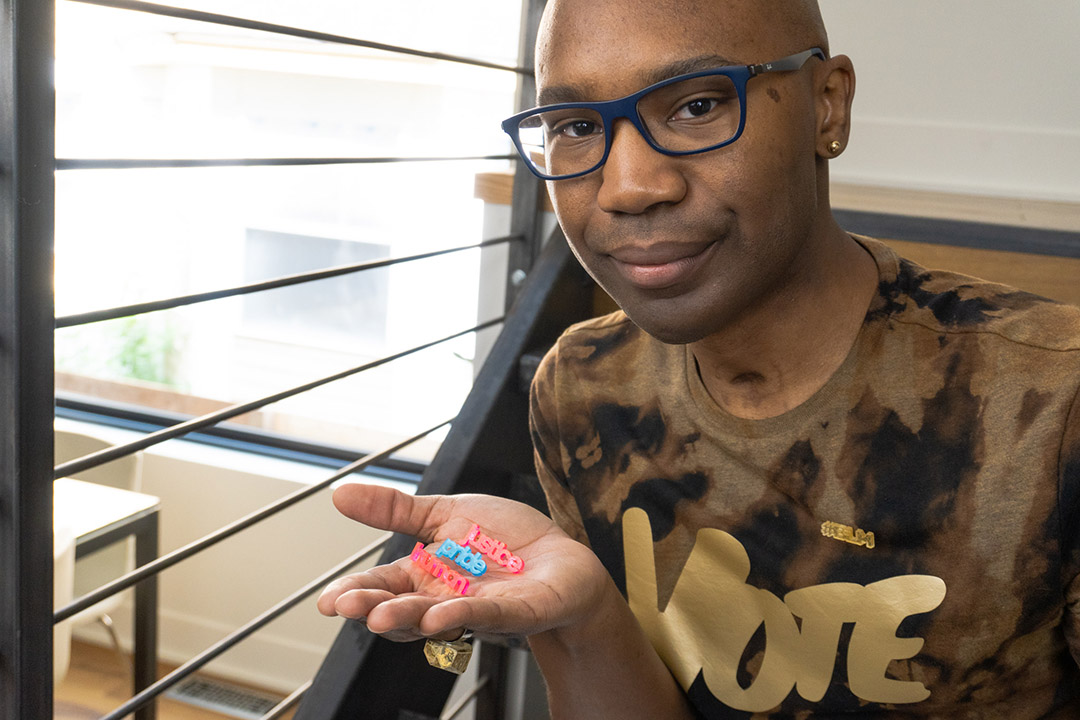How Storytelling, Press Kits Can Showcase Your Business to Future Customers
It’s one thing to have an amazing business. It’s another to be able to talk about that business succinctly and share information about it that’s memorable. That’s where storytelling — and a killer press kit — come in.
How you present your business and tell people about it can help you get noticed and garner media attention. Learn about the power of storytelling in business and get tips from a Kansas City entrepreneur who propelled his businesses into the spotlight by making the most of these opportunities.
How to tell your brand’s story
Branding and marketing can seem like big skills best left to the experts. But every person is really skilled at telling at least one good story. Think about a tale you tell that always gets people engaged. Chances are it has a compelling plot and characters who are relatable.
Telling the story of your business is no different. As marketer Neil Patel points out, a brand story should be simple: problem, solution, success. That’s it. The story of your business is why it exists.
Finetuning your story might take some time. But the end goal is a succinct narrative that’s engaging and answers:
- What problem do you solve?
- How do you solve it?
- How does this make you and your customers successful?
This story is the foundation of your branding and marketing efforts. It’s a good basis for your elevator pitch. And it can help you create an informative press kit that will make it easy for news outlets, funders and friends to spread the word.

Kansas City social entrepreneur Godfrey Riddle leveraged his story and press kit to spread the word about his business, Civic Saint.
The power of a strong media kit
Think public relations is just for big corporations? Think again!
Godfrey Riddle is a familiar face around the KC entrepreneurial ecosystem. In 2020, he started Civic Saint to sell apparel and accessories featuring affirmations about equality and worth. Recently, he’s pivoted to earthen bricks to build affordable homes.
Godfrey’s venture isn’t a huge one, but it has garnered significant press. He’s also won pitch competitions. A clear business story and an up-to-date, accessible press kit have helped.
“Press kits serve as an entry point to your business for media professionals,” he says. “You want to make it as easy as possible for media professionals to spotlight your business, products and/or services. Press kits are a form of relationship building and customer service.”
Godfrey recommends that small business owners keep it simple. Here are his four tips for an effective media kit:
- Cover the basics. What does a media professional need to know about you, your business and/or your products to write an article? That’s the information that should be included in your press kit. A few photos can increase your visibility, too.
- Keep it short. Keep in mind that reporters review dozens of press kits each day. Make yours stand out with clear formatting. And include contact information so media pros can reach you quickly if they need more info. Also, make sure you get to the point quickly. A study found that in an email, you have 8 seconds to get a reader’s attention.
- Make it accessible. Consider adding a “Press” section on your website with high-resolution photos and your story. Or share those materials via Dropbox or Google Drive. No matter how you make them available, ensure your files are clearly titled and include photo credits where applicable.
- Update it regularly. A 3-year-old press release doesn’t generate a lot of confidence. Revise your press kit at least annually, ideally more often. And be sure to update it when something major happens, like awards, funding or milestones.
A press kit can pack a big punch. But it doesn’t have to break the bank.
How to DIY a press kit on the cheap
There’s no one standard media kit design. It just needs to provide information, reflect your brand and look professional. You can create the kit yourself or get a little help from the pros for not a lot of cash.
“I spent $800 on mine between paying for a photographer, food for the shoot and mockup products,” Godfrey says.
Online resources like Canva, Microsoft and MasterClass offer media kit guidance and templates. You can also get inspiration for how to best tell your story, thanks to examples of successful media kits.
Entrepreneurs are used to figuring it out as they go along, and Godfrey notes that press kits are no exception.
“When it doubt, Google it!” he says. “Literally, Google ‘how to write a press release’ or ‘what goes in a press kit’ and read the top two or three articles; then, use that knowledge as your guide.”
Help with branding, storytelling, marketing and more
Google is great, but real, live Kansas Citians are here to help, too. No matter your question or need, KCSourceLink’s Resource Partners offer free or low-cost guidance. Check out our Resource Navigator to learn about more than 230 local programs and organizations that can help you meet your business goals. The KCSourceLink Calendar lists all upcoming entrepreneurial workshops, classes and events, too.
If you don’t even know where to start, KCSourceLink’s Network Navigators have got your back. Just answer a few questions, and they’ll create your free Personal Action Plan. It’s an individualized checklist of what to do and who to meet in the Kansas City area to get your business moving in the right direction.




